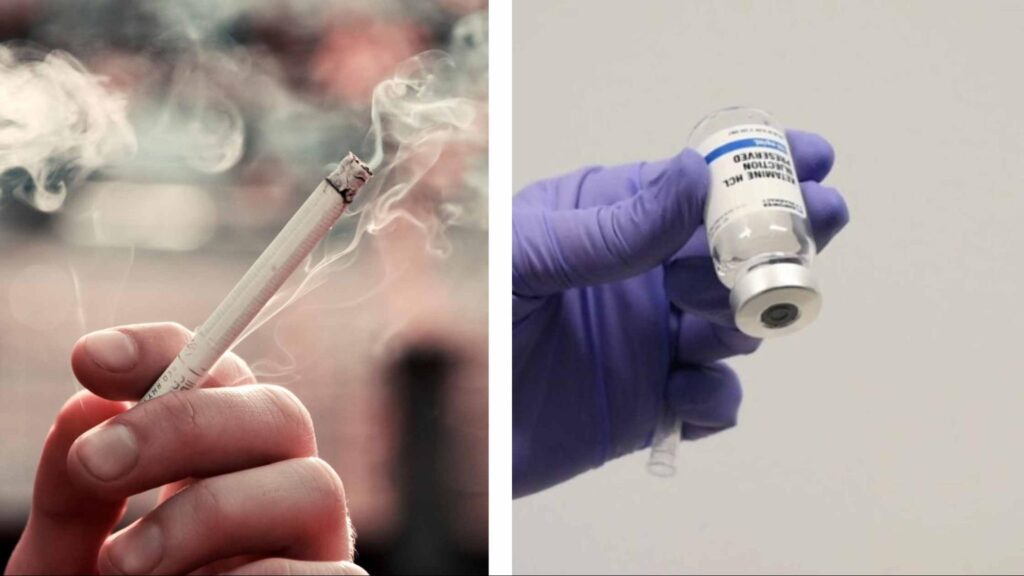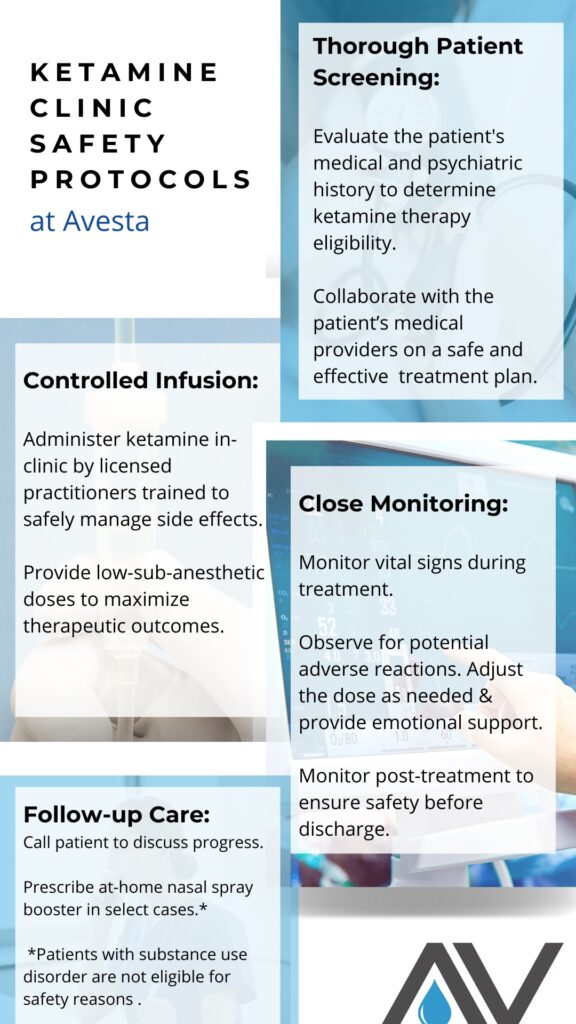Written by Dr. Ladan Eshkevari
In this Post:
- Does Matthew Perry’s Toxicology Report Prove Ketamine Caused His Death?
- Is Ketamine Therapy Safe for People with Addiction?
- Is Ketamine Addictive?
- Can People with Depression Safely Undergo Treatment?
- What Safety Protocols Do Ketamine Clinics Use?
- Do Ketamine Infusions Have Short Term Side Effects?
- What are the Long Term Effects of Ketamine Treatment?
- Should Everyone Try Ketamine Therapy?
- The Bottom Line
Actor Matthew Perry’s cause of death, attributed to”the acute effects of ketamine,” sparked widespread debate regarding ketamine therapy safety, particularly for people with substance use disorders (SUDs). This tragic event, coupled with ketamine’s implicated role in the death of Elijah McClain, an unarmed Black man encountering police in Aurora, has intensified scrutiny on this dissociative anesthetic compound.
Amidst this backdrop, people are collectively asking, is ketamine therapy safe?
Dr. Ladan Eshkevari, Avesta’s co-CEO, spoke with USA Today, offering her expert perspective on ketamine therapy safety for depression and substance use disorders. Dr. Eshkevari distinguishes between supervised ketamine therapy and at-home use and examines short-term and long-term side effects in the article.
Does Matthew Perry’s Toxicology Report Prove Ketamine Caused His Death?
Matthew Perry’s toxicology report showed he had a high anesthetic dose of ketamine in his system at the time of his death.
Ketamine can both increase heart rate and cause cardiac depression in patients who have may heart disease, which appeared to be the case with Mr. Perry.
Additionally, the autopsy found buprenorphine, an opioid, and benzodiazepines (Lorazepam), an anti-anxiety drug. Together with large ketamine doses, this combination could have created additive sedative effects, causing somnolence (extreme drowsiness) and respiratory depression.
So Mr. Perry could have either had a fatal arrhythmia due to ketamine’s cardiac effects or could have fallen asleep and drowned from the additive sedation from anesthetic ketamine doses, buprenorphine, and lorazepam. The autopsy report mentions both of these possible mechanisms.
Is Ketamine Therapy Safe for People with Addiction?

It is entirely fair to ask if ketamine therapy is safe for people with a history of addiction. After all, Matthew Perry had a long history of SUD and mental illness. And in the weeks leading up to his death, reports indicated he was undergoing ketamine infusion therapy for depression.
Still, the answer remains yes. Ketamine therapy is safe and effective for people with substance use disorder under clinically screened and supervised conditions. Indeed, ketamine therapy can even be beneficial for resolving addiction.
However, at-home unsupervised ketamine therapy, even if prescribed or used recreationally, can be risky because the drug can have adverse side effects at higher doses. Personal use also increases the risk of misuse, addiction, and overdose. Reputable clinicians do not prescribe at-home ketamine lozenges or sprays to people with substance use disorders (SUD) for this reason.

Clinical observations and data
Avesta has treated over 1,000 patients in its McLean, Virginia, Bethesda, Maryland, and Washington D.C. ketamine clinics. Many suffered from substance use disorders ranging from alcoholism to opioid addictions.
Repeated ketamine infusions combined with psychotherapy has helped many of these patients overcome addiction and the depression and anxiety that often occur alongside SUD.
Clinical research also highlights ketamine’s potential in managing substance use disorders.
A 2023 systematic review analyzed data from 11 studies involving 854 adult patients on the effectiveness of ketamine therapy for alcohol use disorder (AUD). The review found that.
- Ketamine, especially in combination with psychotherapy, showed favorable results in achieving abstinence and reducing alcohol consumption. Results varied for relapse, craving, and withdrawal.
- The study concluded that ketamine might be effective for those unresponsive to first-line AUD treatments.
Another systematic review in the Front Psychiatry journal revealed key findings on ketamine’s impact on opioid and cocaine use disorders.
- For cocaine, studies showed that ketamine significantly reduced cravings and self-administration.
- Regarding opioid use, the research found higher abstinence rates and reduced cravings with high-dose ketamine, complemented by efficacy in alleviating opioid withdrawal symptoms.
Limitations
Avesta’s clinical observations and both systematic reviews indicate ketamine is well-tolerated and potentially effective for substance use disorders. However, the scientific community needs more longitudinal data to determine whether these patients remained abstinent and healthy long-term. Additionally, more robust clinical trials must better ascertain efficacy, safety, and dosing strategies.
Is Ketamine Addictive?

Ketamine, unlike opioids, is not associated with physiologically addictive properties. It’s also far less psychologically addictive than common substances like nicotine and alcohol.
However, like any drug or pleasurable experience, ketamine can be habit-forming, and people can access it on the black market.
To that end, reputable ketamine therapy practitioners must educate patients about these risks and implore them to limit usage to legal, monitored clinical settings.
Is Ketamine Therapy Safe for People with Depression?

Successful studies on low-dose ketamine infusions for treatment-resistant depression have been mounting for decades. Avests has personally treated hundreds of patients with debilitating depression and suicidality and witnessed ketamine rapidly reduce symptoms in hours. Infusions are also effective for people experiencing anxiety and depression concurrently.
However, ketamine therapy is not a cure-all.
At Avesta, we always recommend patients see a qualified ketamine therapist between sessions to process their insights and visions. We also strongly advise patients to see a psychotherapist long-term to maintain the benefits for months and years to come. Achieving enduring mental health is a life-long practice.
What Safety Protocols Do Ketamine Clinics Use?
Reputable ketamine clinics employ rigorous protocols to ensure the safety of all patients. They utilize additional measures to prevent ketamine misuse in patients with substance use disorder.

1. Thorough Patient Screening:
Ketamine clinics conduct detailed medical and psychiatric evaluations to identify potential contraindications or risk factors, such as psychosis, uncontrolled hypertension, or severe thyroid disease.
Clinicians also collaborate with patients’ current medical and psychotherapy providers to examine their mental state, potential for addiction, and suitability for ketamine therapy.
The screening process involves informing the patient about the potential benefits, risks, and side effects.
2. Controlled Administration:
In trustworthy clinics, only licensed healthcare professionals, such as nurses or anesthesiologists, administer ketamine. These clinicians are trained to use the drug safely and manage potential side effects.
Additionally, clinicians carefully administer low therapeutic doses, typically intravenously over 40-60 minutes, minimizing the risk of misuse.
3. Close Monitoring:
Clinicians continuously monitor vital signs like blood pressure, heart rate, and oxygen saturation throughout the treatment to ensure patient safety.
Most clinics also observe patients for signs of dissociation, agitation, or other adverse psychological reactions. For example, Avesta’s trained ketamine coaches provide care and comfort to those who may need emotional support.
Following the infusion, ketamine clinics observe patients until the majority of the short-term effects subside, ensuring their well-being before discharge.
4. Follow-up Care:
Ketamine clinics typically call or schedule follow-up appointments to monitor patient progress, address side effects, and adjust the treatment plan as needed.
Sometimes, clinicians prescribe intranasal ketamine spray for at-home use between sessions to maximize benefits. However, patients with substance abuse histories are not eligible for this booster protocol. Clinics like Avesta understand that supervised ketamine therapy is the only way to treat addiction issues safely.
Finally, licensed centers often provide educational resources and support groups to help patients manage their expectations and cope with any challenges. Avesta offers patients a list of vetted ketamine integration therapists in the McLean, Bethesda, and D.C. areas to continue their healing journey.

What are the Short Term Side Effects of Ketamine Infusions?
Ketamine infusions elicit several physical and emotional short term side effects. Some can be beneficial, like dissociation, and others can be uncomfortable, like nausea. Regardless, all acute side effects wear off within hours.
- Dissociative Symptoms: Patients may experience a disconnection from their body and surroundings, often described as a floating sensation or an out-of-body experience.
- Nausea and Vomiting: These gastrointestinal side effects are relatively common but can be managed with anti-nausea medications.
- Increased Blood Pressure and Heart Rate: Ketamine can cause temporary increases in blood pressure and heart rate during and shortly after the infusion. Clinicians monitor patients’ vitals to ensure they are in a safe range.
- Dizziness and Lightheadedness: Patients might feel dizzy or lightheaded, which usually resolves shortly after the infusion ends.
- Blurred Vision or Double Vision: Visual disturbances, including blurred or double vision, can occur during the ketamine infusion.
- Mood Changes: Some patients may experience mood swings or affect changes following the infusion.
- Anxiety or Panic: In rare cases, ketamine can induce feelings of anxiety or panic. Coaches and therapists often sit with patients during sessions to provide support as needed.
- Headache: Some individuals might experience a headache during or after ketamine treatment.
What are the Long Term Effects of Ketamine Treatment?

Studies have not shown any negative long-term effects of ketamine infusions in clinical settings. However, chronic, high-dose usage can cause long-term consequences, including:
- Discomfort while urinating
- Increased heart rate,
- Raised blood pressure
- Kidney damage
- Respiratory depression
- Memory problems
- Flashbacks
- Mood issues and personality changes
- Risk of dependence and overdose
Additionally, some experts have expressed concerns about the long-term effects of ketamine on the still-developing adolescent brain.
Should Everyone Try Ketamine Therapy?

Not everyone is an ideal candidate for ketamine therapy, whether in-clinic or at home. Ketamine’s powerful dissociative-sedative effects and habit-forming potential mean that patients with uncontrolled blood pressure, psychosis, and ketamine allergies may not be eligible.
Patients with the following conditions must request a consultation with a ketamine clinician and talk to their medical providers about whether this approach can be safe and effective:
- Uncontrolled high blood pressure or unmanaged heart disease
- Unmanaged hyperthyroidism
- Bipolar disorder and psychosis
- Ketamine allergies or intolerance
- Older adults with extensive medical histories
- Medication use including lamotrigine, benzodiazepines and antipsychotics
People with substance use disorders are eligible for ketamine therapy but are not candidates for at-home protocols.

The Bottom Line
Matthew Perry’s death was tragic on every imaginable level. His toxicology report raised important questions about addiction, ketamine dosing, and the dangers of mixing powerful narcotics. However, the horrific situation was not an indictment of clinical ketamine treatments. Ketamine therapy remains a life-saving protocol for people with mental health issues, substance use disorders, and chronic pain. Clinics with stringent safety protocols that educate patients about the risks are invaluable caretakers in the world of dangerously inadequate mental healthcare.
Our Avesta team prioritizes safety above all else. We also believe all patients deserve access to life-saving ketamine therapy. If you’re struggling with mental illness and substance use disorder, contact our team to find out if you’re eligible for in-clinic infusions.

